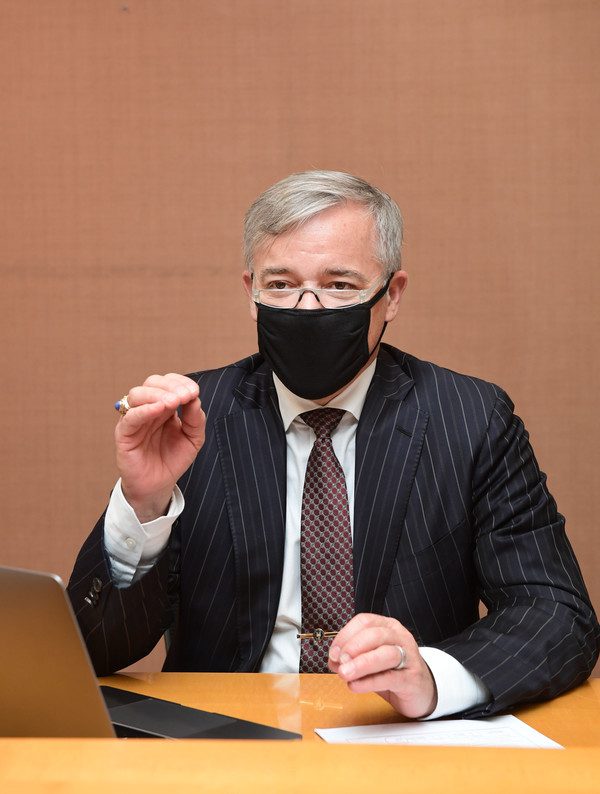A global medical affairs executive at Moderna said the company’s Covid-19 vaccine was safe and effective not only for adults but children.
He emphasized the vaccine’s safety amid the rising demand for booster shots, sparked by a recent spread of the highly transmissible Omicron variant.

On Thursday, Randall N. Hyer, senior vice president of Global Medical Affairs at Moderna, held a press conference at a hotel in Seoul.
He emphasized that the efficacy and safety of Moderna’s Covid-19 vaccine have been confirmed in adults, adolescents, and children.
Hyer also said the U.S. biotech firm was working on a vaccine to prevent Omicron infection.
Recently, some countries in Europe, Korea, and Japan have restricted Moderna jabs for adolescents aged 12 to 17 due to the risk of heart inflammation.
The U.S. FDA also delayed the decision on Moderna’s Covid-19 vaccine for 12- to 17-year-olds for the same reason.
Regarding the matter, Hyer said Moderna confirmed the efficacy and safety of its Covid-19 vaccine not only for adults and adolescents but children.
“We also confirmed through our data that the vaccine’s risk of myocarditis was no different from that of Pfizer’s vaccine,” he said.
Hyer said Covid-19 patients had a higher chance of myocarditis than the general public but vaccinated people had a significantly low risk of myocarditis.
The incidence of myocarditis and pericarditis among vaccinated people aged 30 or less was 0.45 (0.45 person per 100,000 people) in the Pfizer group, and 0.49 in the Moderna group, according to monitoring data presented by Hyer.
Moderna was developing three vaccine strategies to fight the Omicron variant, Hyer went on to say.
The first is to double the dose of the existing vaccine to 100μg, the second is to add the Beta variant to the existing vaccine (mRNA-1273.211) or combine the Beta and Delta variants (mRNA-1273.213), and the third is to develop a new vaccine to target the Omicron variant.
Moderna was conducting studies to fight Omicron in the fastest and most effective way and plans to find the most efficient method and begin a trial, Hyer said.
He also encouraged Korean researchers to participate in the Moderna Fellowship Program actively.
The fellowship program supports independent research of clinicians or scientists interested in advancing mRNA research and innovation.
Moderna awards the fellowship for between one and three years in various fields, including clinical medicine, basic research, epidemiology, pharmacology, and nursing.
The fellowship salary will be $75,000 per year at maximum and research expenses, $100,000 per year at maximum. The deadline for applications for the fellowship is Dec. 31, 2021.
According to Moderna, Hyer has over 30 years of experience in medicine and public health in the public and private sectors.
He served at the WHO as a medical officer to respond to outbreaks and emergencies such as anthrax, Ebola, SARS, avian influenza, tsunamis, and earthquakes.
In 2017, he played a pivotal role in getting the FDA’s approval for a two-dose adult hepatitis B vaccine (Heplisav-B), the first novel adjuvant authorized by the FDA.
At Moderna, Hyer also directs vaccine and pharmaceutical safety programs, oversees clinical vaccine operations and biometrics functions, engages in communication with medical scientists and policymakers, and manages crises.

